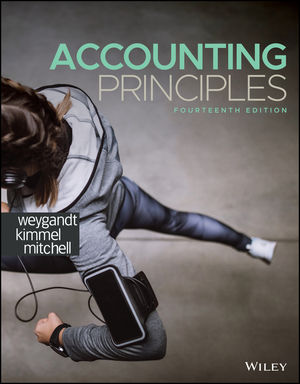
Accounting Principles, 14th Edition
By Jerry J. Weygandt, Paul D. Kimmel, and Jill E. Mitchell
Accounting Principles, 14th Edition provides students with a clear overview of fundamental financial and managerial accounting concepts with a focus on learning the accounting cycle from the sole proprietor perspective. Through a primary review of accounting transactions, integrated real-world examples, and a variety of practice opportunities, students develop a thorough understanding of how to apply accounting principles and techniques in practice.
Students work through an engaging interactive program that builds their mastery of accounting concepts with an emphasis on decision making and key data analysis skills appropriate at the introductory level that keeps them on track and better prepared to connect the classroom to the real world.
Want to learn more about WileyPLUS? Click Here
Learn Accounting Concepts Efficiently
Solution Walkthrough Videos provide 24/7, just-in-time homework assistance for hundreds of exercises and problems in the WileyPLUS course. Thes videos break down the process of completing complex homework questions to help students build their understanding of tackling and working through an entire accounting problem, improving their understanding and increasing their confidence.
Adaptive Assignments ignite students’ confidence to persist so they can develop critical skills. By continuously adapting to each students’ needs and providing achievable goals with just-in-time instruction, Adaptive Assignments close knowledge gaps through scaffolded learning. Powered and refined by the Knewton Adaptive Engine, with more than 15 million users, this new assignment type gives instructors the flexibility and control to create targeted adaptive experiences that match their teaching preferences. With actionable analytics to support student and class intervention, Adaptive Assignments makes teaching and learning more efficient than ever.
Interactive Assignments to Keep Students Engaged
Interactive Tutorial Assignments provide a guided walkthrough and review of key chapter content and topics, including Chapter Overview Videos, Lecture Videos for each learning objective, and various real world videos featuring professionals in the field, such as Practice with a Pro and Ask an Expert. Embedded Interactive Knowledge Checks and Do It! questions ensure student understanding and word retention and build confidence. The Interactive Tutorial Assignments are also flexible and can be customizable, available as practice, or assignable for points.
Develop Data Analytics and Literacy Skills
Help students develop foundational data analytics software skills with Data Analysis Technology Bootcamps, available for Excel, Tableau, Power BI, Alteryx, and SQL. Each bootcamp includes Overview Videos, How-To Videos, and Solution Walkthrough Videos to ensure students have the support they need to learn how to use the software and perform specific tasks, as well as assignable application exercises and data sets to help students demonstrate their understanding of the tool in an accounting context.
Power BI and Tableau Visualization Assignments in WileyPLUS familiarize students with popular data analysis tools they will encounter in the workplace. Students analyze a variety of visualizations available in both software programs, completing assessment questions along the way to check their understanding and ability to interpret different forms of information, and practice making informed business decisions.
The WileyPLUS Data Set Library provides instructors with the flexibility to choose how they want to build and assess students’ data analytics skills. A variety of free data sets are available for you to access across all WileyPLUS Accounting courses, saving you valuable time in sourcing out data sets to use with projects, assessments, and homework.
Solve Business Problems with Excel
Gradable Excel Assignments develop the Excel knowledge and skills students need by giving them the opportunity to practice using formulas and functions to complete specific exercises in a real Microsoft Excel worksheet. With exercises based on accounting questions from the book, automatic grading, and immediate and detailed cell-level feedback, students build key skills needed to be competitive in today’s job market while enhancing their understanding of key accounting concepts.
Incorporate Cutting-Edge Topics
Introduce your students to ESG in the accounting context with the WileyPLUS ESG Module, designed to help students understand what ESG is, why it’s important, and how it’s changing the modern accounting and business world. Students work through each pillar of ESG through lessons on Environment, Social, Governance, and Reporting, along with relatable business scenarios with recognizable companies, access to real-world sample reports, and assignable quiz questions.
What’s New to the 14th Edition
- New bulleted and numbered approach helps highlight key information and computations while allowing students to learn new concepts in bite-sized chunks of information.
- New Data Analytics Insight boxes highlight the use of data analytics by real-world companies.
- New Analytics in Action end-of-chapter problems (in select chapters) include data visualization and/or analytics, application, and assessment to help students understand the use of data analytics by real-world companies.
- New chapter discussions of data analytics at the appropriate level for introductory accounting students.
- Updated discussions, illustrations, and examples within the accounting cycle chapters help ensure maximum student understanding.
- Updated discussions throughout the text reflect the latest developments and the use of new technology such as cloud computing.
- Updated real-world company examples ensure concepts are relatable and presented in an engaging way for students to make connections.
- New Answers to Insight and Accounting Across the Organization questions help students easily verify their understanding of course concepts.
- End-of-Chapter material now includes Bloom’s Taxonomy codes.
- Streamlined IFRS Insights section within each financial chapter allows students to focus on the most important similarities and differences between GAAP and IFRS.

JERRY J. WEYGANDT, PhD, CPA, is Arthur Andersen Alumni Emeritus Professor of Accounting at the University of Wisconsin—Madison. He holds a Ph.D. in accounting from the University of Illinois. Articles by Professor Weygandt have appeared in The Accounting Review, Journal of Accounting Research, Accounting Horizons, Journal of Accountancy, and other academic and professional journals. These articles have examined such financial reporting issues as accounting for price-level adjustments, pensions, convertible securities, stock option contracts, and interim reports. Professor Weygandt is author of other accounting and financial reporting books and is a member of the American Accounting Association, the American Institute of Certified Public Accountants, and the Wisconsin Society of Certified Public Accountants. He has served on numerous committees of the American Accounting Association and as a member of the editorial board of the Accounting Review; he also has served as President and Secretary-Treasurer of the American Accounting Association. In addition, he has been actively involved with the American Institute of Certified Public Accountants and has been a member of the Accounting Standards Executive Committee (AcSEC) of that organization. He has served on the FASB task force that examined the reporting issues related to accounting for income taxes and served as a trustee of the Financial Accounting Foundation.
Professor Weygandt has received the Chancellor’s Award for Excellence in Teaching and the Beta Gamma Sigma Dean’s Teaching Award. He is on the board of directors of M & I Bank of Southern Wisconsin. He is the recipient of the Wisconsin Institute of CPA’s Outstanding Educator’s Award and the Lifetime Achievement Award. In 2001 he received the American Accounting Association’s Outstanding Educator Award.

Paul D. Kimmel, PhD, CPA, received his bachelor’s degree from the University of Minnesota and his doctorate in accounting from the University of Wisconsin. He is a Senior Lecturer at the University of Wisconsin-Madison and was an Associate Professor at University of Wisconsin – Milwaukee. He was the recipient of the UWM School of Business Advisory Council Teaching Award, the Reggie Taite Excellence in Teaching Award, and a three-time winner of the Outstanding Teaching Assistant Award at the University of Wisconsin. He has public accounting experience with Deloitte & Touche (Minneapolis) and was a recipient of the Elijah Watts Sells Award for Honorary Distinction for his results on the CPA exam. He is a member of the American Accounting Association and the Institute of Management Accountants and has published articles in Accounting Review, Accounting Horizons, Advances in Management Accounting, Managerial Finance, Issues in Accounting Education, Journal of Accounting Education, and in other journals. He has authored a number of introductory accounting textbooks, and published papers and given numerous talks on issues related to accounting education.

Jill Mitchell, MS, MEd, CIA, is a Professor of Accounting at Northern Virginia Community College (NOVA), where she has taught face-to-face, hybrid, and online courses since 2008. Since 2009, she has been an Adjunct Instructor at George Mason University (GMU). She is former President of the Washington, D.C. Chapter of the Accounting and Financial Women’s Alliance (AFWA), and has served on the board of directors of the Virginia Society of CPAs (VSCPA). She is a member of the American Accounting Association (AAA) and the Institute of Internal Auditors. Jill serves on the AAA Education Committee and the Conference on Teaching and Learning Accounting (CTLA) Steering Committee. She received the Community College Champion Award for her work as a founding advisor for the National Society of Collegiate Scholars NOVA Chapter. Prior to joining the faculty at NOVA, Jill was a Senior Auditor with Ernst & Young’s Business Risk Services practice in Miami, Florida. She is a Certified Internal Auditor and holds an MS in Accountancy from the University of Virginia and a BBA in Management Information Systems from the University of Georgia honors program. Recently, she earned an MEd in Instructional Design Technology from GMU.
Jill is a 2019 recipient of the Outstanding Faculty Award, the Commonwealth’s highest honor for faculty of Virginia’s universities and colleges presented by the State Council of Higher Education for Virginia; the Virginia Community College System Chancellor’s Award for Teaching Excellence, the AFWA’s Women Who Count Award; and the AAA/J. Michael and Mary Anne Cook/Deloitte Foundation Prize, the foremost recognition of an individual who consistently demonstrates the attributes of a superior teacher in the discipline of accounting. Jill is also recipient of the AAA Two-Year College Educator of the Year Award for 2019 – 2020.
Chapter 1: Accounting in Action
Chapter 2: The Recording Process
Chapter 3: Adjusting the Accounts
Chapter 4: Completing the Accounting Cycle
Chapter 5: Accounting for Merchandising Operations (Perpetual Approach)
Chapter 5A: Accounting for Merchandising Operations (Periodic Approach)
Chapter 6: Inventories (Periodic Approach)
Chapter 6A: Inventories (Perpetual Approach)
Chapter 7: Accounting Information Systems
Chapter 8: Fraud, Internal Control, and Cash
Chapter 9: Accounting for Receivables
Chapter 10: Plant Assets, Neutral Resources, and Intangible Assets
Chapter 11: Current Liabilities and Payroll Accounting
Chapter 12: Accounting for Partnerships
Chapter 13: Corporations: Organization and Capital Stock Transactions
Chapter 14: Corporations: Dividends, Retained Earnings, and Income Reporting
Chapter 15: Long-Term Liabilities
Chapter 16: Investments
Chapter 17: Statement of Cash Flows
Chapter 18: Financial Statement Analysis
Chapter 19: Managerial Accounting
Chapter 20: Job Order Costing
Chapter 20A: Job Order Costing (Non-Debit and Credit Approach)
Chapter 21: Process Costing
Chapter 22: Cost-Volume-Profit
Chapter 23: Incremental Analysis
Chapter 24: Budgetary Planning
Chapter 25: Budgetary Control and Responsibility Accounting
Chapter 26: Standard Costs and Balanced Scorecard
Chapter 27: Planning for Capital Investments
Appendices A-F: Financial Statements for Apple, Pepsi, Coca-Cola, Amazon.com, Wal-Mart, Louis Vuitton
Appendix G: Time Value of Money
Appendix H: Activity-Based Costing

